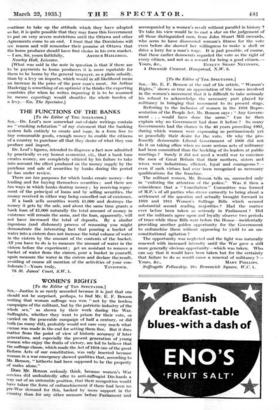[To the Editor of THE SPECTATOR.] SIR,—Mr. E. F. Benson
at the end of his article, " Women's Rights," shows so true an appreciation of the issues involved in the women's movement that it is difficult to take seriously his refusal to acknowledge the necessary part played by militancy in bringing that movement to its present stage.
Referring to the inclusion of women in the 1918 Repre- sentation of the People Act, Mr. Benson says : " Any Govern- ment . . . would have done the same." Can he then explain why no Government had done it before ? So many Governments had the chance in the 40 years preceding 1905, during which women were expressing so pertinaciously yet so peacefully their desire for the vote. Or why the pro- fessedly democratic Liberal Government of 1906 did not do it on taking office when no more serious acts of militancy had been committed than the heckling of its leaders at public meetings ? Surely it did not need a world war to convince the men of Great Britain that their mothers, sisters and wives Were industrious, efficient, loyal and courageous ?- even if such virtues had ever been recognized as necessary qualifications for the franchise.
The militant women, Mr. Benson tells us, succeeded only in "enlisting the attention of the police." Was it then a coincidence that a " Conciliation " Committee was formed of M.P.'s of all parties who strove earnestly to bring about a settlement of the question and actually brought forward in 1910 and 1911 Women's Suffrage Bills which secured substantial second reading majorities ? Had the matter ever before been taken so seriously in Parliament ? Did not the militants agree upon and loyally observe two periods of truce while these Bills were before the House—incidentally providing another golden opportunity for the Government to enfranchise them without appearing to yield to an un- constitutional agitation ?
The opportunity was neglected and the fight was naturally renewed with increased intensity until the War gave a still more generally obvious opportunity—which was taken. Who can say that it would have been taken but for the certainty that failure to do so would cause a renewal of militancy ?-




























































 Previous page
Previous page